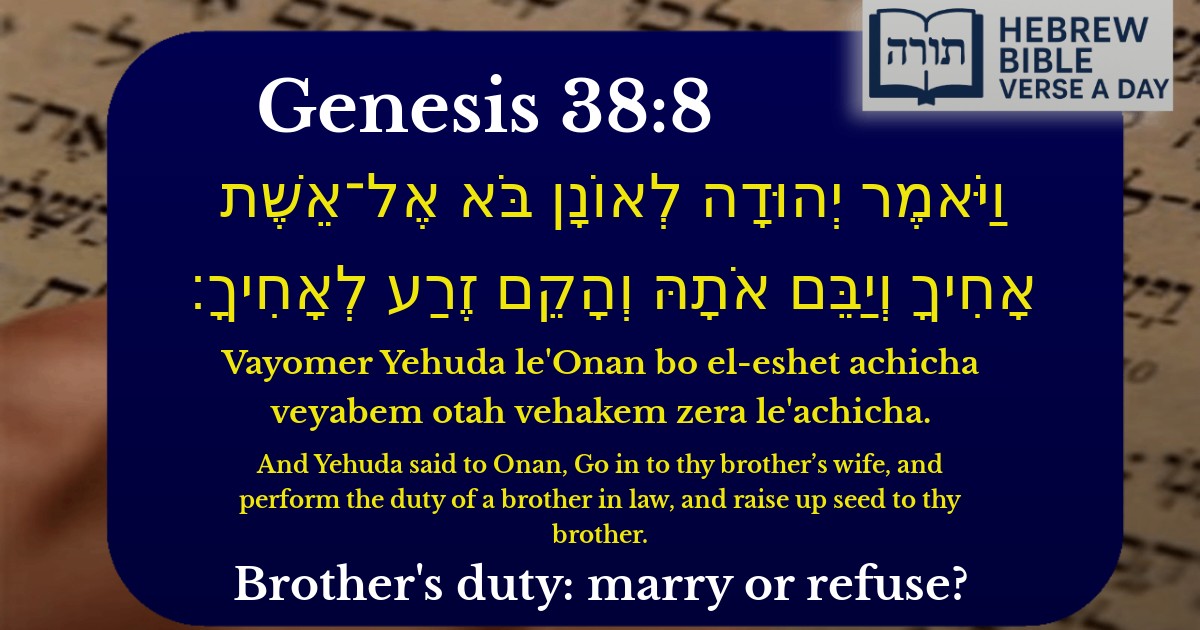Join Our Newsletter To Be Informed When New Videos Are Posted
Join the thousands of fellow Studends who rely on our videos to learn how to read the bible in Hebrew for free!
Hebrew Text
וַיֹּאמֶר יְהוּדָה לְאוֹנָן בֹּא אֶל־אֵשֶׁת אָחִיךָ וְיַבֵּם אֹתָהּ וְהָקֵם זֶרַע לְאָחִיךָ׃
English Translation
And Yehuda said to Onan, Go in to thy brother’s wife, and perform the duty of a brother in law, and raise up seed to thy brother.
Transliteration
Vayomer Yehuda le'Onan bo el-eshet achicha veyabem otah vehakem zera le'achicha.
Hebrew Leining Text
וַיֹּ֤אמֶר יְהוּדָה֙ לְאוֹנָ֔ן בֹּ֛א אֶל־אֵ֥שֶׁת אָחִ֖יךָ וְיַבֵּ֣ם אֹתָ֑הּ וְהָקֵ֥ם זֶ֖רַע לְאָחִֽיךָ׃
וַיֹּ֤אמֶר יְהוּדָה֙ לְאוֹנָ֔ן בֹּ֛א אֶל־אֵ֥שֶׁת אָחִ֖יךָ וְיַבֵּ֣ם אֹתָ֑הּ וְהָקֵ֥ם זֶ֖רַע לְאָחִֽיךָ׃
🎵 Listen to leining
Parasha Commentary
📚 Talmud Citations
This verse is quoted in the Talmud.
📖 Yevamot 34b
The verse is discussed in the context of the laws of levirate marriage (yibbum), where the obligation of a brother to marry his deceased brother's wife is analyzed.
📖 Sanhedrin 58b
The verse is referenced in a discussion about the prohibition of Onan's act (onanism) and its implications for marital relations.


The Mitzvah of Yibum (Levirate Marriage)
The verse describes Yehuda instructing his son Onan to fulfill the obligation of yibum (levirate marriage) with Tamar, the widow of his deceased brother Er. This mitzvah is later codified in the Torah (Devarim 25:5-6) and requires a brother to marry his childless brother's widow to perpetuate the deceased brother's name and lineage.
Rashi's Explanation
Rashi (on Bereishit 38:8) explains that Yehuda was acting in accordance with the divine will, as this mitzvah was already known to the patriarchs even before it was formally given at Har Sinai. He notes that Yehuda understood the importance of building the family line, as this was part of the covenant with Avraham regarding his descendants.
Onan's Sin
The Talmud (Yevamot 34b) discusses how Onan's refusal to properly fulfill this mitzvah (by practicing coitus interruptus) was considered a grave sin. The Rambam (Hilchos Yibum 1:1) explains that the primary purpose of yibum is to establish offspring in the deceased brother's name, and any act that frustrates this purpose violates the mitzvah.
Spiritual Significance
Halachic Dimensions
The Shulchan Aruch (Even HaEzer 165) details the complex halachos surrounding yibum, including when it applies and when chalitza (the alternative ceremony of release) is preferable. The Rema notes that in his time, the custom was generally to perform chalitza rather than yibum.